新概念英语第一册 Lesson 75-76 课件(共54张PPT)
文档属性
| 名称 | 新概念英语第一册 Lesson 75-76 课件(共54张PPT) |
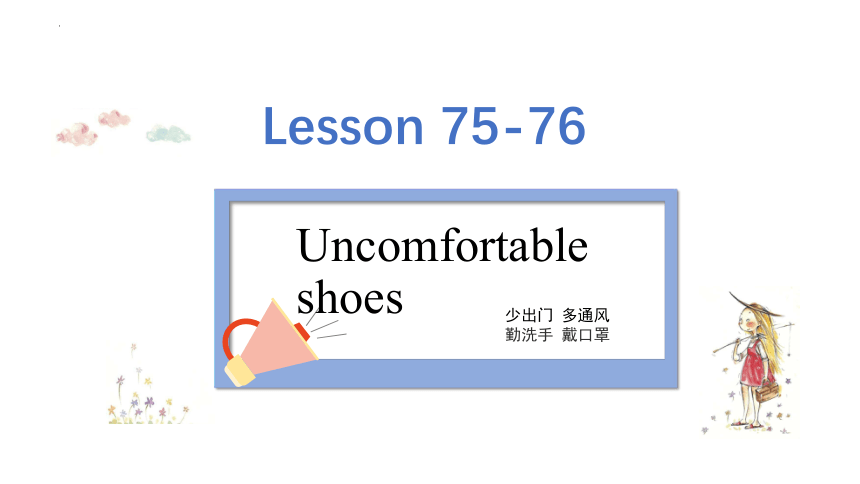
|
|
| 格式 | pptx | ||
| 文件大小 | 6.1MB | ||
| 资源类型 | 教案 | ||
| 版本资源 | 新概念英语 | ||
| 科目 | 英语 | ||
| 更新时间 | 2024-07-30 00:00:00 | ||
图片预览

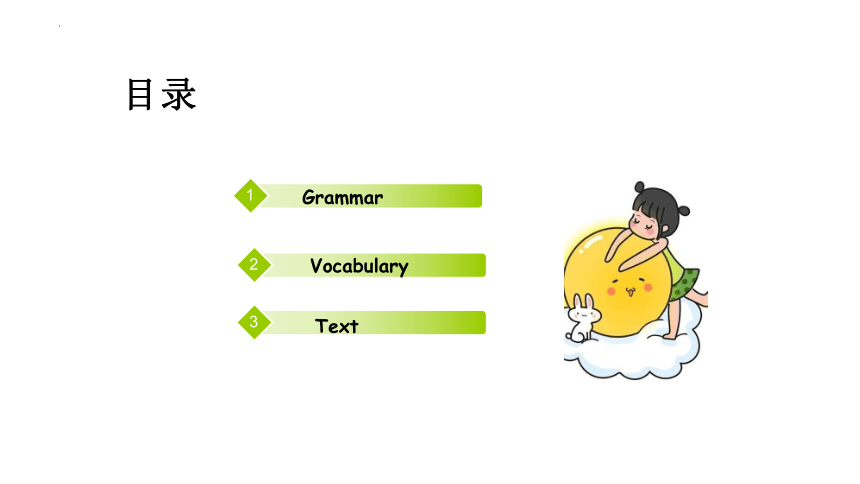
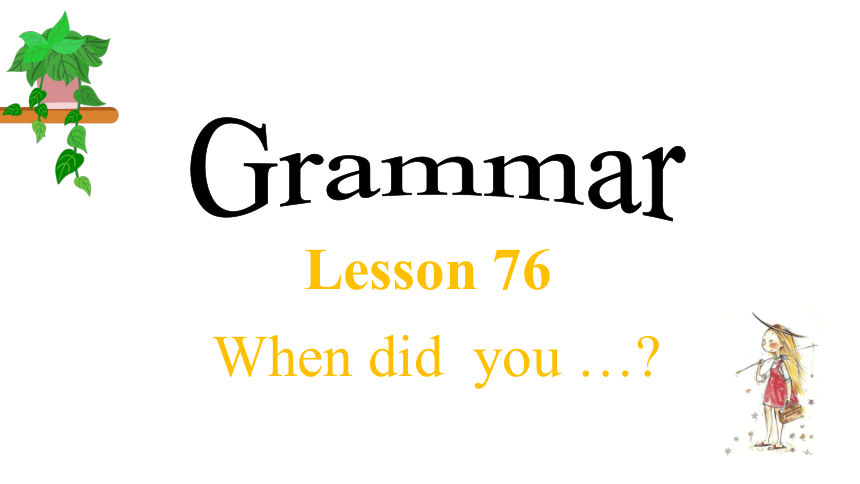
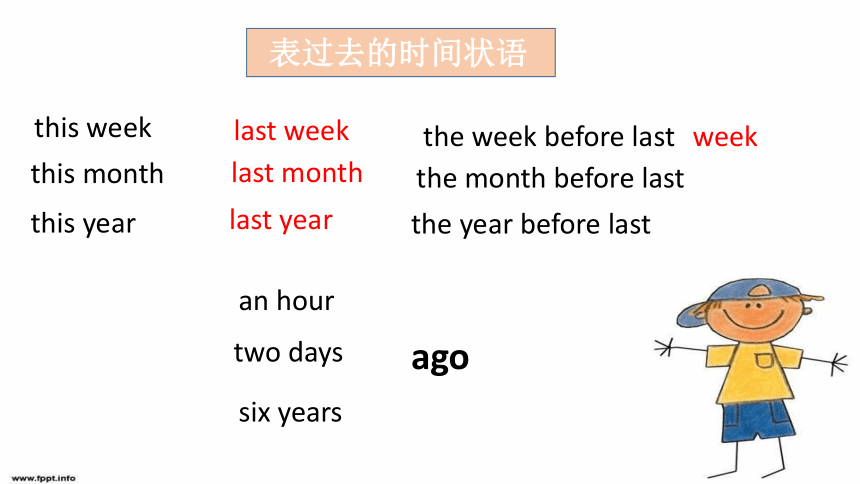
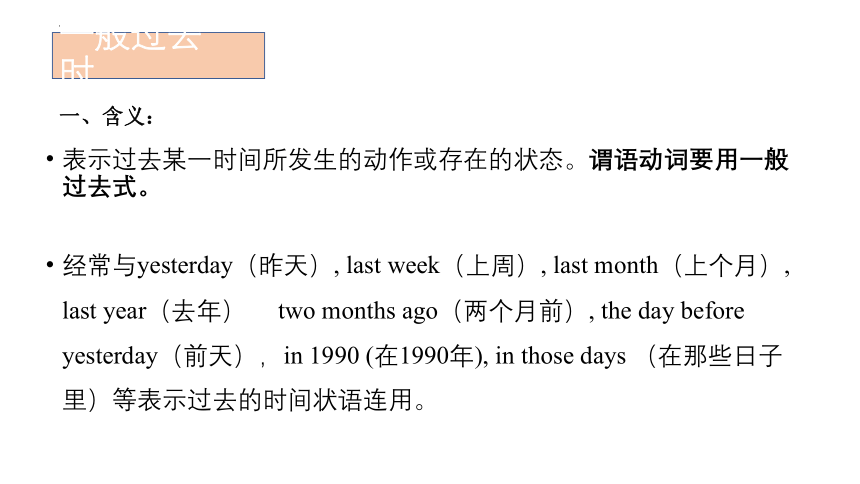
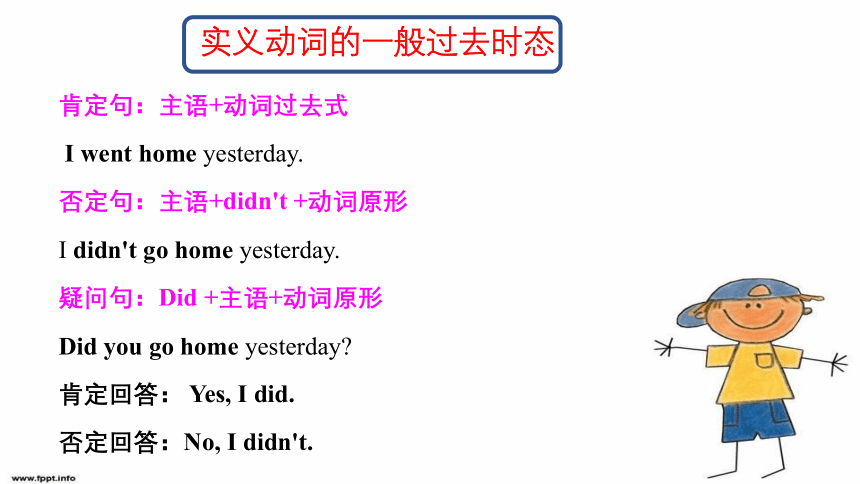
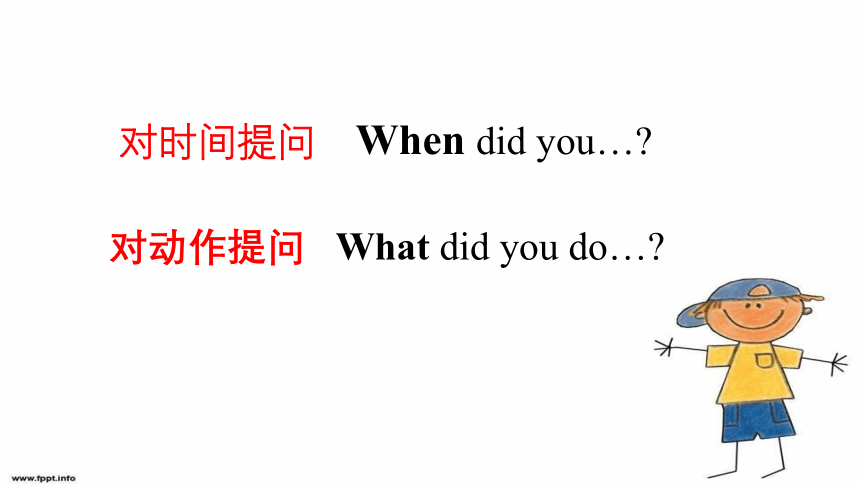
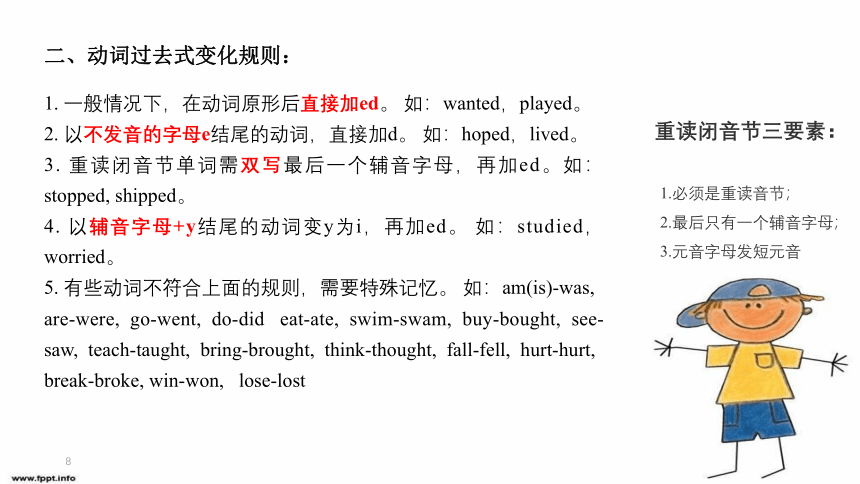
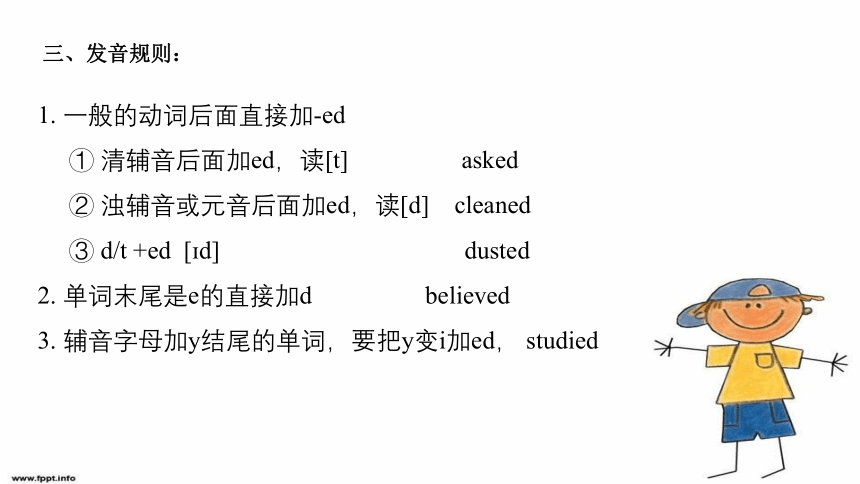
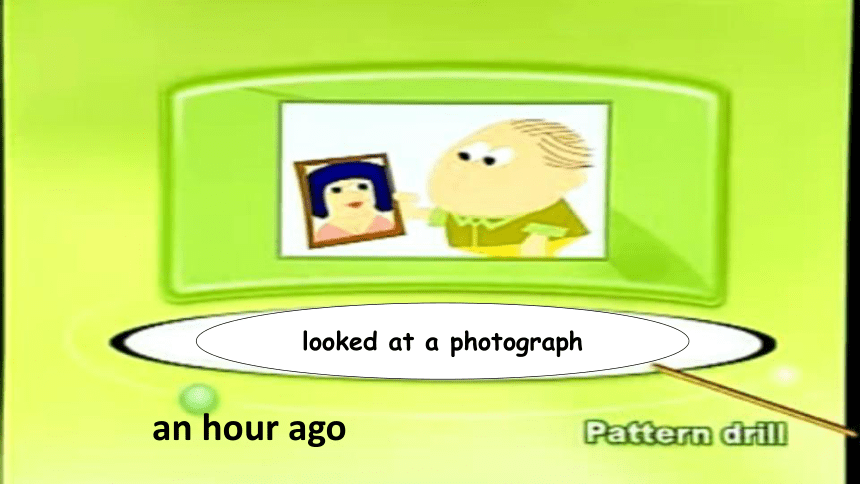
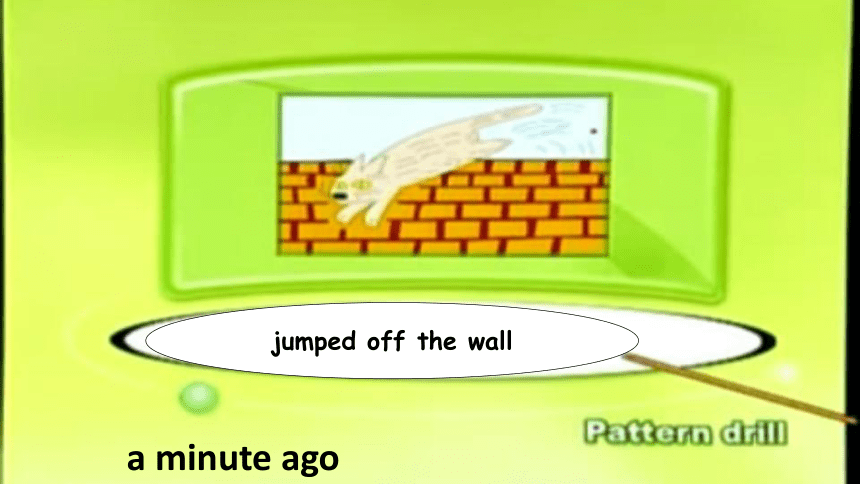
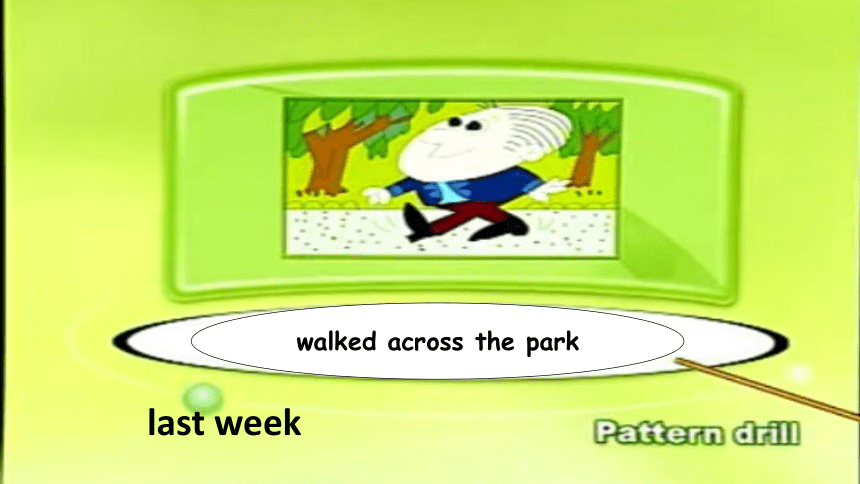
文档简介
(共54张PPT)
Lesson 75-76
少出门 多通风
勤洗手 戴口罩
Uncomfortable shoes
Grammar
1
Vocabulary
2
Text
3
目录
Grammar
Lesson 76
When did you …
this month
this year
this week
last year
week
last week
ago
the month before last
the year before last
the week before last
last month
two days
six years
an hour
表过去的时间状语
一般过去时
表示过去某一时间所发生的动作或存在的状态。谓语动词要用一般过去式。
经常与yesterday(昨天), last week(上周), last month(上个月), last year(去年) two months ago(两个月前), the day before yesterday(前天),in 1990 (在1990年), in those days (在那些日子里)等表示过去的时间状语连用。
一、含义:
实义动词的一般过去时态
肯定句:主语+动词过去式
I went home yesterday.
否定句:主语+didn't +动词原形
I didn't go home yesterday.
疑问句:Did +主语+动词原形
Did you go home yesterday
肯定回答: Yes, I did.
否定回答:No, I didn't.
对时间提问 When did you…
对动作提问 What did you do…
8
1. 一般情况下,在动词原形后直接加ed。 如:wanted,played。
2. 以不发音的字母e结尾的动词,直接加d。 如:hoped,lived。
3. 重读闭音节单词需双写最后一个辅音字母,再加ed。如:stopped, shipped。
4. 以辅音字母+y结尾的动词变y为i,再加ed。 如:studied,worried。
5. 有些动词不符合上面的规则,需要特殊记忆。 如:am(is)-was, are-were, go-went, do-did eat-ate, swim-swam, buy-bought, see-saw, teach-taught, bring-brought, think-thought, fall-fell, hurt-hurt, break-broke, win-won, lose-lost
二、动词过去式变化规则:
重读闭音节三要素:
1.必须是重读音节;
2.最后只有一个辅音字母;
3.元音字母发短元音
1. 一般的动词后面直接加-ed
① 清辅音后面加ed,读[t] asked
② 浊辅音或元音后面加ed,读[d] cleaned
③ d/t +ed [ d] dusted
2. 单词末尾是e的直接加d believed
3. 辅音字母加y结尾的单词,要把y变i加ed, studied
三、发音规则:
an hour ago
looked at a photograph
a minute ago
jumped off the wall
last week
walked across the park
an hour ago
washed his hands
last year
worked in an office
five minutes ago
asked a question
a month ago
typed those letters
every day this week
watched television
last month
talked to the salesman
two weeks ago
thanked her father
an hour ago
dusted the cupboard
three hours ago
waited at the bus stop
the year before last
painted that bookcase
a year ago
wanted a car like that one
a day ago
greeted her
has
are
don’t watch
doesn’t go
Do
like
likes
looks
watches
goes
改错
went--go
have--had
taughts--taught
saw--see
wasn’t—didn’t
do
wait—waited
find—found
Vocabulary
How many kinds of shoes do you know?
Brainstorm
athletic shoes /sports shoes
hiking shoes/travelling shoes
casual shoes
sandals
slippers
high-heeled shoes/high heels
canvas
work boots
Do you like this style
comfortable
lovely
in fashion
New words and expressions
ago adv. 以前
buy (bought) v. 买
pair n. 双,对
fashion n. (服装)流行式样
uncomfortable adj. 不舒服的
wear (wore) v. 穿着
ago 用于一般过去时;
我三天前去了伦敦。
I went to London three days ago.
她30分钟前离开的。
She left 30 minutes ago.
★ago adv. 以前
7/24/2024
区别ago/ before
ago 只用于一般过去时,表示从现在算起的一段时间以前。
He died two years ago.
before 后接“时间点”,可用于任何时态;它也可放在“时间段”后,用于完成时或一般过去时。
I got there before 5 o’clock.
He will finish the work before tomorrow.
He had done it two days before.
我上个月给妈妈买了一件外套。
I bought a coat for my mother last month.
= I bought my mother a coat last month.
★buy v. 买
bought-bought (buy sb sth=buy sth for sb)
sell v.卖
sold-sold
This kind of dress sells very well.
这种连衣裙卖的好。
★pair n. 双,对
一副手套是件好礼物。
A pair of gloves is a nice present.
我只有一双手(忙不过来)。
I have only one pair of hands.
three pairs of stockings
数词+量词+of+名词
a pair of glasses 一副眼镜
a pair of shoes一双鞋子
a pair of jeans一条牛仔裤
a pair of chopsticks 一双筷子
be in fashion ……是流行的
今年流行这种颜色。
This color is in fashion this year.
= This color is fashionable this year.
be out of fashion 不流行
★fashion n. (服装的)流行式样
反义词:comfortable
注意:un-前缀表示否定“不…”, 如
happy-unhappy friendly-unfriendly
① adj. 不舒服的
她穿紧脚的靴子觉得不舒服。
She feels uncomfortable in tight boots.
★uncomfortable adj. 不舒服的
7/24/2024
② adj. 不安的;不自在的
如果你自己坐在那就会有不自在的感觉。
You’ll have an uncomfortable feeling if you sit there alone.
他和陌生人在一起时经常觉得不安。
He often feels uncomfortable with strangers.
我每天都穿同一件外套。
I wear the same coat every day.
他每天都戴领带。
He wears a tie every day.
这位女士穿着一件很漂亮的裙子。
The lady is wearing a beautiful dress.
★wear v. 穿着
wore-worn
wear 表穿着的状态
那个女孩每天都穿粉红色的衬衣。
That girl wears a pink shirt every day.
put on 表穿上的动作
请穿上你的外套
Please put on your coat.
be dressed in 穿着……衣服,侧重打扮
那位女士在昨天晚上的晚会上穿了一件很滑稽的外套。
The lady was dressed in a funny coat at the party last night.
★区别“wear” “put on” “be dressed in”
Text
Watch and answer the question
What size are the lady’s shoes
Size five.
Read and answer the questions
1. Who bought this pair of shoes last month
2. Where did she buy this pair of shoes
3. Why can’t the shop assistant get a pair of
shoes for the lady
some和any “一些“,修饰可数名词和不可数名词。
some ①一般用在肯定句中。
②有时也用于疑问句,表示期望得到肯定回答,并不表示对某事有疑问。
教室里有一些女孩。
There are some girls in the classroom.
请给我一些墨水好吗
Will you give me some ink
any一般用于疑问句和否定句中。
墙上有地图吗
Are there any maps on the wall
房子后面没有树。
There aren't any trees behind the house.
介词,像….
Don’t treat me like a guest.
2. What size
What size =What size do you want
size: S----small
M---middle
L---large
XL---extra large
What colour =What colour do you want
3. We don’t have any.
此为省略句,any 后面省略了black shoes.
4. We had some shoes like those a month ago.
一段时间+ago,意为“多长时间以前”,与过去式连用。
我一个月前买了一台电脑。
我两天前读了这本故事书。
7/24/2024
5. I’m afraid that I can’t.
I’m afraid that … 我恐怕…
一般后接“宾语从句”
什么是宾语?
在英语中,一般是名词或代词做宾语,
宾语一般是跟在动词或介词后。
什么是从句?
必须符合“从句的三个必须”
1.必须是句子;2.必须有连接词;3.必须是陈述句
宾语从句
在英语中,一般是名词或代词做宾语,宾语一般是跟在动词或介词后。
I want an apple.
Put on it!
由一个句子来充当宾语,就是宾语从句。
I am afraid that I can't .
= I am afraid that I can't get a pair for you.
宾语从句跟在两类词后:
1. 表示人的情感或心理活动的形容词
afraid/ sure/ sorry/ glad/ anxious/ confident/ proud
S+ be+ adj. + 宾语从句
主句和宾语从句中有that连接,后边加句子。
当主句是一般现在时,从句可以用任何时态。
我担心我明天去不了了。
I am afraid that I can't come tomorrow.
很抱歉我昨天没有去。
I am sorry that I didn't go yesterday.
2. S+ v. +that +从句
其中的动词为: think/ know/ believe/ say/ hope/ understand
她知道你会来的。
She knows that you will come.
我相信我能飞。
I believe (that) I can fly.
状态系动词
可用来表示主语性质或状态,只有be一词
He is a teacher.
He is ill.
感官系动词
感官系动词主要有feel, smell, sound, taste, look
这种布手感很软。
This kind of cloth feels very soft.
这朵花闻起来很香。
This flower smells very sweet.
The story sounds true.
Those oranges taste good.
LADY : Do you have any shoes
SALESMAN: What size
Lady: .
Salesman: What colour
Lady: .
Salesman: I’m sorry. We don’t have .
Lady: But my sister last month.
Salesman: Did she them here
Lady: No, she them in the U.S.
Salesman: We had some shoes a month
ago, but we don’t have any now.
Lady: Can you please
Salesman: I’m afraid that . They
last year and the year before last.
But they’re not in fashion this year.
Salesman: These shoes are in fashion now.
Lady: They very uncomfortable.
Salesman: They are very uncomfortable. But
women always !
Homework
不
多
哟
!
准备L75-L76的听写。
发L75-76的录音(课文读一遍,单词两遍)。
听读并背诵L75的课文。
完成配套练习作业+抄写单词两遍。
Lesson 75-76
少出门 多通风
勤洗手 戴口罩
Uncomfortable shoes
Grammar
1
Vocabulary
2
Text
3
目录
Grammar
Lesson 76
When did you …
this month
this year
this week
last year
week
last week
ago
the month before last
the year before last
the week before last
last month
two days
six years
an hour
表过去的时间状语
一般过去时
表示过去某一时间所发生的动作或存在的状态。谓语动词要用一般过去式。
经常与yesterday(昨天), last week(上周), last month(上个月), last year(去年) two months ago(两个月前), the day before yesterday(前天),in 1990 (在1990年), in those days (在那些日子里)等表示过去的时间状语连用。
一、含义:
实义动词的一般过去时态
肯定句:主语+动词过去式
I went home yesterday.
否定句:主语+didn't +动词原形
I didn't go home yesterday.
疑问句:Did +主语+动词原形
Did you go home yesterday
肯定回答: Yes, I did.
否定回答:No, I didn't.
对时间提问 When did you…
对动作提问 What did you do…
8
1. 一般情况下,在动词原形后直接加ed。 如:wanted,played。
2. 以不发音的字母e结尾的动词,直接加d。 如:hoped,lived。
3. 重读闭音节单词需双写最后一个辅音字母,再加ed。如:stopped, shipped。
4. 以辅音字母+y结尾的动词变y为i,再加ed。 如:studied,worried。
5. 有些动词不符合上面的规则,需要特殊记忆。 如:am(is)-was, are-were, go-went, do-did eat-ate, swim-swam, buy-bought, see-saw, teach-taught, bring-brought, think-thought, fall-fell, hurt-hurt, break-broke, win-won, lose-lost
二、动词过去式变化规则:
重读闭音节三要素:
1.必须是重读音节;
2.最后只有一个辅音字母;
3.元音字母发短元音
1. 一般的动词后面直接加-ed
① 清辅音后面加ed,读[t] asked
② 浊辅音或元音后面加ed,读[d] cleaned
③ d/t +ed [ d] dusted
2. 单词末尾是e的直接加d believed
3. 辅音字母加y结尾的单词,要把y变i加ed, studied
三、发音规则:
an hour ago
looked at a photograph
a minute ago
jumped off the wall
last week
walked across the park
an hour ago
washed his hands
last year
worked in an office
five minutes ago
asked a question
a month ago
typed those letters
every day this week
watched television
last month
talked to the salesman
two weeks ago
thanked her father
an hour ago
dusted the cupboard
three hours ago
waited at the bus stop
the year before last
painted that bookcase
a year ago
wanted a car like that one
a day ago
greeted her
has
are
don’t watch
doesn’t go
Do
like
likes
looks
watches
goes
改错
went--go
have--had
taughts--taught
saw--see
wasn’t—didn’t
do
wait—waited
find—found
Vocabulary
How many kinds of shoes do you know?
Brainstorm
athletic shoes /sports shoes
hiking shoes/travelling shoes
casual shoes
sandals
slippers
high-heeled shoes/high heels
canvas
work boots
Do you like this style
comfortable
lovely
in fashion
New words and expressions
ago adv. 以前
buy (bought) v. 买
pair n. 双,对
fashion n. (服装)流行式样
uncomfortable adj. 不舒服的
wear (wore) v. 穿着
ago 用于一般过去时;
我三天前去了伦敦。
I went to London three days ago.
她30分钟前离开的。
She left 30 minutes ago.
★ago adv. 以前
7/24/2024
区别ago/ before
ago 只用于一般过去时,表示从现在算起的一段时间以前。
He died two years ago.
before 后接“时间点”,可用于任何时态;它也可放在“时间段”后,用于完成时或一般过去时。
I got there before 5 o’clock.
He will finish the work before tomorrow.
He had done it two days before.
我上个月给妈妈买了一件外套。
I bought a coat for my mother last month.
= I bought my mother a coat last month.
★buy v. 买
bought-bought (buy sb sth=buy sth for sb)
sell v.卖
sold-sold
This kind of dress sells very well.
这种连衣裙卖的好。
★pair n. 双,对
一副手套是件好礼物。
A pair of gloves is a nice present.
我只有一双手(忙不过来)。
I have only one pair of hands.
three pairs of stockings
数词+量词+of+名词
a pair of glasses 一副眼镜
a pair of shoes一双鞋子
a pair of jeans一条牛仔裤
a pair of chopsticks 一双筷子
be in fashion ……是流行的
今年流行这种颜色。
This color is in fashion this year.
= This color is fashionable this year.
be out of fashion 不流行
★fashion n. (服装的)流行式样
反义词:comfortable
注意:un-前缀表示否定“不…”, 如
happy-unhappy friendly-unfriendly
① adj. 不舒服的
她穿紧脚的靴子觉得不舒服。
She feels uncomfortable in tight boots.
★uncomfortable adj. 不舒服的
7/24/2024
② adj. 不安的;不自在的
如果你自己坐在那就会有不自在的感觉。
You’ll have an uncomfortable feeling if you sit there alone.
他和陌生人在一起时经常觉得不安。
He often feels uncomfortable with strangers.
我每天都穿同一件外套。
I wear the same coat every day.
他每天都戴领带。
He wears a tie every day.
这位女士穿着一件很漂亮的裙子。
The lady is wearing a beautiful dress.
★wear v. 穿着
wore-worn
wear 表穿着的状态
那个女孩每天都穿粉红色的衬衣。
That girl wears a pink shirt every day.
put on 表穿上的动作
请穿上你的外套
Please put on your coat.
be dressed in 穿着……衣服,侧重打扮
那位女士在昨天晚上的晚会上穿了一件很滑稽的外套。
The lady was dressed in a funny coat at the party last night.
★区别“wear” “put on” “be dressed in”
Text
Watch and answer the question
What size are the lady’s shoes
Size five.
Read and answer the questions
1. Who bought this pair of shoes last month
2. Where did she buy this pair of shoes
3. Why can’t the shop assistant get a pair of
shoes for the lady
some和any “一些“,修饰可数名词和不可数名词。
some ①一般用在肯定句中。
②有时也用于疑问句,表示期望得到肯定回答,并不表示对某事有疑问。
教室里有一些女孩。
There are some girls in the classroom.
请给我一些墨水好吗
Will you give me some ink
any一般用于疑问句和否定句中。
墙上有地图吗
Are there any maps on the wall
房子后面没有树。
There aren't any trees behind the house.
介词,像….
Don’t treat me like a guest.
2. What size
What size =What size do you want
size: S----small
M---middle
L---large
XL---extra large
What colour =What colour do you want
3. We don’t have any.
此为省略句,any 后面省略了black shoes.
4. We had some shoes like those a month ago.
一段时间+ago,意为“多长时间以前”,与过去式连用。
我一个月前买了一台电脑。
我两天前读了这本故事书。
7/24/2024
5. I’m afraid that I can’t.
I’m afraid that … 我恐怕…
一般后接“宾语从句”
什么是宾语?
在英语中,一般是名词或代词做宾语,
宾语一般是跟在动词或介词后。
什么是从句?
必须符合“从句的三个必须”
1.必须是句子;2.必须有连接词;3.必须是陈述句
宾语从句
在英语中,一般是名词或代词做宾语,宾语一般是跟在动词或介词后。
I want an apple.
Put on it!
由一个句子来充当宾语,就是宾语从句。
I am afraid that I can't .
= I am afraid that I can't get a pair for you.
宾语从句跟在两类词后:
1. 表示人的情感或心理活动的形容词
afraid/ sure/ sorry/ glad/ anxious/ confident/ proud
S+ be+ adj. + 宾语从句
主句和宾语从句中有that连接,后边加句子。
当主句是一般现在时,从句可以用任何时态。
我担心我明天去不了了。
I am afraid that I can't come tomorrow.
很抱歉我昨天没有去。
I am sorry that I didn't go yesterday.
2. S+ v. +that +从句
其中的动词为: think/ know/ believe/ say/ hope/ understand
她知道你会来的。
She knows that you will come.
我相信我能飞。
I believe (that) I can fly.
状态系动词
可用来表示主语性质或状态,只有be一词
He is a teacher.
He is ill.
感官系动词
感官系动词主要有feel, smell, sound, taste, look
这种布手感很软。
This kind of cloth feels very soft.
这朵花闻起来很香。
This flower smells very sweet.
The story sounds true.
Those oranges taste good.
LADY : Do you have any shoes
SALESMAN: What size
Lady: .
Salesman: What colour
Lady: .
Salesman: I’m sorry. We don’t have .
Lady: But my sister last month.
Salesman: Did she them here
Lady: No, she them in the U.S.
Salesman: We had some shoes a month
ago, but we don’t have any now.
Lady: Can you please
Salesman: I’m afraid that . They
last year and the year before last.
But they’re not in fashion this year.
Salesman: These shoes are in fashion now.
Lady: They very uncomfortable.
Salesman: They are very uncomfortable. But
women always !
Homework
不
多
哟
!
准备L75-L76的听写。
发L75-76的录音(课文读一遍,单词两遍)。
听读并背诵L75的课文。
完成配套练习作业+抄写单词两遍。
同课章节目录
